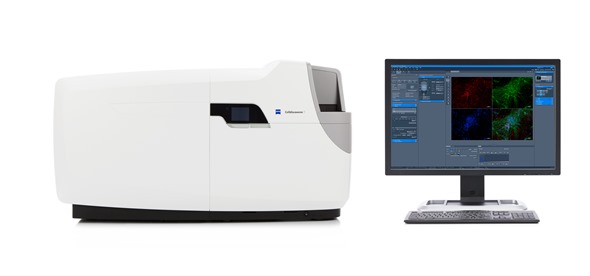ZEISS introduces a new system for automated microscopy in life sciences research. ZEISS Celldiscoverer 7 combines the user-friendly automation features of a boxed microscope with the image quality and flexibility of a classic inverted research microscope. Scientists acquire better data in shorter times with 2D or 3D cell cultures, tissue sections or small model organisms.

In contrast to other boxed microscopes with limited flexibility, ZEISS Celldiscoverer 7 can be adapted to a whole range of tasks and applications. The system comes with various incubation and detection options and can be tailored to the individual needs of research labs.
Users can choose from a selected range of microscope cameras for even the most demanding live cell experiments and rapid time-lapse recordings. In particular, the new ZEISS Axiocam 512 mono microscope camera with highest 12 MP resolution and a large field of view allows fluorescence screening applications with high throughput.
The new optical design of ZEISS Celldiscoverer 7 together with advanced automatic calibration routines helps researchers to achieve reproducible high quality data even from complex long-term, time-lapse imaging experiments.
A new hardware-based autofocus not only finds and keeps the focus automatically, but also detects the thickness and optical properties of the sample carrier. This information is then used to adapt the unique ZEISS Autocorr objectives to deliver the best image quality possible.
ZEISS Celldiscoverer 7 is controlled by ZEN imaging software that provides additional key features for the automated microscope system. The dedicated software package from ZEISS for example calculates the maximal scanning area for any sample carrier automatically and actively protects the objective from collisions with your sample vessel or other hardware components.
ZEN 2.3 offers convenient experiment setup with user-friendly automation wizards, large-data acquisition, and data processing in 2D and 3D. The newly developed optics of ZEISS Celldiscoverer 7 in combination with rapid GPU-based deconvolution algorithms allow scientists to extract a maximum of information from their samples, artifact-free and in the shortest time possible.
As ZEN supports open interfaces and scripting, ZEISS Celldiscoverer 7 can be integrated in virtually every lab workflow. Experiment data is easily exported to a multitude of file formats and third-party image analysis software.
ZEISS Celldiscoverer 7 is the new reliable research platform that offers a unique combination of automation features in life science research. The system will be on display at the upcoming Neuroscience and ASCB annual meetings and is available for live demonstrations worldwide.